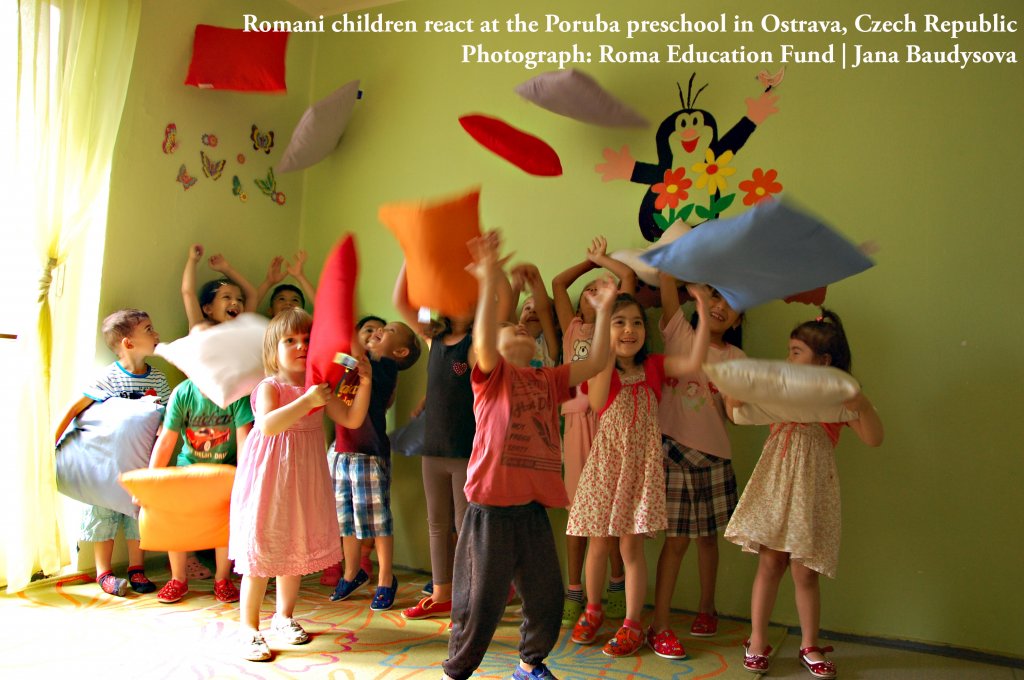2015: REF keeps equity and non-discrimination on Europe’s education agenda
26 January 2015
The most recent EU Education and Training Monitor published late last year issued a stark warning that unless inequality and discrimination are tackled, “returns to investment in education will be sub-optimal and any resulting potential for added economic growth may be compromised.”

The report lays bare the full extent of the damage done to education following the economic and financial crisis that has gripped Europe. Despite critically high levels of youth unemployment, 19 Member States actually cut their education expenditure in 2012. And right across the Union, the hardest hit are the most vulnerable of Europe’s young citizens.
The Monitor’s Europe-wide and country specific recommendations signal a thorough endorsement of the Roma Education Fund (REF) goals to eliminate school segregation; increase access and quality of early childhood education and care (ECEC); reduce early school leaving; increase tertiary level attendance and to boost employability among Roma graduates.
REF’s mission to promote equity, improve quality, broaden access and increase completion rates throughout the entire education cycle, with carefully targeted and closely monitored interventions, provides an actually existing template for what needs to be done across Europe to meet the Monitor’s declared objective.
This objective is to ensure that education is inclusive, nurtures self-development and responsible, active citizenship; better realizes its potential to raise employment rates by delivering the kind of qualifications and competences that increase employability for all learners.
A clear finding is that breaking the vicious cycle of self-perpetuating poverty and lack of qualifications and competences requires Member States to commit higher initial investments in children from disadvantaged backgrounds.
When it comes to ethnic minority populations such as the Roma, the report highlights “processes of assessment which unjustly perceive some children as less educable than others and lead to organizational segregation,” and systematic biases in provision and opportunity. On the issue of tackling inequalities and discrimination, the Monitor has some very direct country specific recommendations for the five newer Member States with significant Roma populations.
In Bulgaria where public expenditure on education is among the lowest in Europe, investments in ECEC, preventing dropouts, training and higher education have decreased in comparison to the EU average. The Monitor calls on Bulgaria to step up efforts to improve access to quality inclusive pre-school and school education of disadvantaged children, in particular Roma.
In the Czech Republic the Monitor states that measures focusing on Roma people are essential, as a high proportion of Roma children leave school early, and participation by Roma children in ECEC (children who stand to benefit the most) is very low. And some seven years after the Ostrava judgment in the European Court, the report notes that “the number of Roma children in special schools, which have lower educational standards, is disproportionately high, reducing their chances of completing upper secondary education and entering the labour market.”
According to the report Hungary shows signs of regress in terms of tackling inequalities since 2010 and significant reductions in annual expenditures for primary and secondary education. According to the Fundamental Rights Agency survey, the drop-out rate amongst students from Roma families is more than seven times higher than amongst those from the non-Roma population. Fewer than one in five Roma children complete secondary education, while a mere 0.5% completes tertiary education. Furthermore, 45% of Roma children attend classes where all or most of the students are also from the Roma population, which indicates that segregation has in fact increased in recent years.
General government expenditure on education as a proportion of GDP in Romania is the lowest in the EU by a substantial margin and has fallen steadily since the onset of the crisis, reaching 3% in 2012. The statistics show that Romania is not only lagging behind the rest of Europe at every stage of the education cycle, but inequalities are particularly stark between Roma and non-Roma, and that for the most disadvantaged the situation is worsening.
In Slovakia, participation in ECEC is among the lowest in the EU and falling. Among marginalized Roma communities the rate is as low as 24%. Early tracking, and the disproportionate placement of Roma pupils in special schools continue to exacerbate inequalities. This discriminatory practice greatly reduces their chances to complete upper-secondary education and enter the labour market, in a country where the labour market disadvantage for people without upper secondary education is significantly higher than it is in the EU.
However, there are clear indicators of how change for the better can happen in education. The cumulative effect of years of work by REF and its partners since the launch of the Decade of Roma Inclusion 2005-2015, has resulted in ever larger cohorts of Roma children enrolling in pre-school, and students successfully graduating from secondary and tertiary education.
In 2013 alone, REF grants supported some 100,900 Romani children, parents and others. The evidence from the ever-increasing number of high quality projects across 15 countries shows that it's possible to narrow this gap in educational outcomes between Roma and non-Roma.
These targeted interventions, that exemplify the EU principle of ‘explicit but not exclusive targeting’ of Roma communities, show that partnerships for equity bring benefits to the entire society. There is a widening consensus and commitment across Europe to try to close this gap. However, it’s clear that much more needs to be done for this commitment to translate into effective implementation on the ground.
This latest EU Education and Training Monitor spells out very precisely what needs to be done to combat discrimination, and fulfill the promise of equity and inclusiveness in education and training for all citizens by 2020.
REF’s experience in working to close the gap between Roma pupils and non-Roma pupils; and REF’s active pursuit of equity in unpropitious times, demonstrates that fostering partnerships between communities, schools, local, regional and national authorities to ‘do the right thing’ makes the most sense for a just, cohesive society and a prosperous future for Europe.




